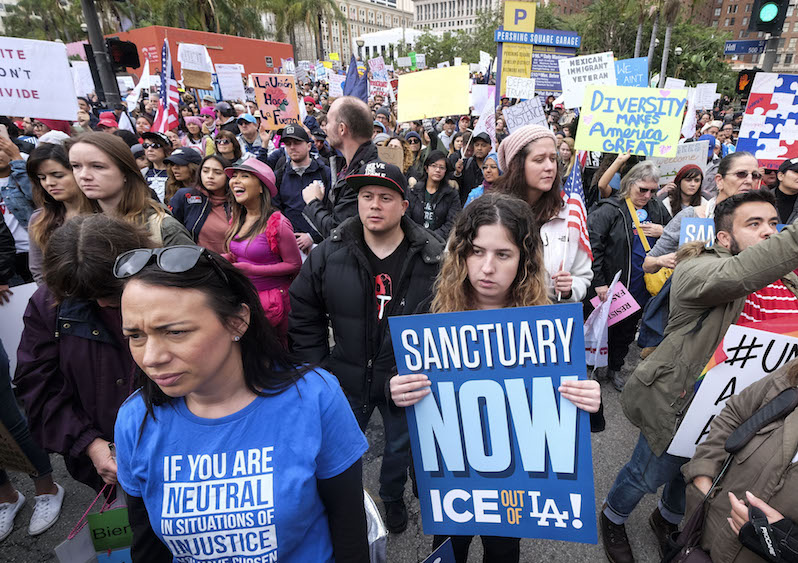A New, Progressive Form of Federalism Is Spreading With the GOP in Control
To derail Donald Trump’s domestic agenda, the left is bolstering the autonomy of states and cities to protect minorities, the poor, the undocumented and our ecosystems. Protesters in February's Free the People Immigration March in Los Angeles. L.A. city officials and residents have been leaders in the anti-Trump resistance movement. (Ringo H.W. Chiu / AP)
1
2
Protesters in February's Free the People Immigration March in Los Angeles. L.A. city officials and residents have been leaders in the anti-Trump resistance movement. (Ringo H.W. Chiu / AP)
1
2

Protesters in February’s Free the People Immigration March in Los Angeles. L.A. city officials and residents have been leaders in the anti-Trump resistance movement. (Ringo H.W. Chiu / AP)
—10th Amendment, Constitution of the United States
You really have to hand it to Jefferson Beauregard Sessions III. He knows how to promote the doctrines of federalism and states’ rights, and tout the importance of the 10th Amendment. The diminutive, 70-year-old attorney general of the United States, whom “The Daily Show” loves to mock as a mean-spirited hobbit from J.R.R. Tolkien’s Middle Earth, has spent much of his long and virulently conservative career in politics and the law supporting such ideas in an effort to limit the scope of federal authority, especially in the fields of civil and voting rights. Now, with the GOP firmly in control of all three branches of government and Sessions hypocritically threatening to enforce President Trump’s Executive Order (EO) No. 13,768—which, among other provisions, calls for cutting off federal funds to so-called sanctuary cities—Sessions has managed to convert a growing number of liberals and progressives to the federalist cause. We are, as a result, witnessing the spread of a new, progressive form of federalism. When you think about it, the conversion makes perfect sense. To derail the Trump administration’s domestic agenda—not just as it affects sanctuary jurisdictions, but also on gay and transgender rights, criminal justice and police reform, abortion, federal enforcement of marijuana laws, and the erosion of environmental safeguards—progressives are taking a cue from the right to bolster the autonomy of states and cities as they enact and defend initiatives aimed at protecting minorities, the poor, the undocumented and our ecosystems. For much of the 20th century to the present, federalism was code for political reaction under the guise of strict constructionism. From economic questions, such as the legality of the federal minimum wage, to issues of school desegregation, conservatives time and again invoked the 10th Amendment as a basis for preserving the privileges of local elites, corporations, and racial and misogynistic hierarchies, while liberals sought to expand the reach of the Constitution and national regulatory oversight. Still, federalism as a legal philosophy has never been the exclusive preserve of the right. There is an inherent tension in our constitutional structure, dating to the founding era, between Jeffersonian decentralists and Hamiltonian advocates of national power. Often, the decentralists have stood against human rights, but not always. As writer/producer Gail Ablow noted in a recent column posted by Moyers & Company, many important legal struggles began at the state level before succeeding on a national scale. In 1783, for example, long before the enactment of the 13th Amendment in 1865, Massachusetts abolished slavery in its state Constitution. Wyoming, of all places, accorded women the unrestricted right to vote in 1869, well ahead of the ratification of the 19th Amendment in 1920. “It is one of the happy incidents of the federal system that a single courageous state may, if its citizens choose, serve as a laboratory” of democracy, the great Supreme Court Justice Louis Brandeis wrote in a dissenting opinion penned in 1932. Perhaps the leading exponent of progressive federalism today is professor Heather Gerken, selected in February as the first female dean of Yale Law School. In an interview published on the school’s website last December, Gerken explained her outlook:My main goal is to convince people that federalism, which most people associate with conservatism, doesn’t have a political valence. Progressives have long ignored the many democratic benefits associated with federalism and localism because they associate decentralization with racism and parochialism. They look to the national government to protect racial minorities and dissenters. But this is not your father’s federalism. Because minorities can rule at the local level, states and local governments have become sites for empowering racial minorities and dissenters, the very groups that progressives believe have the most to fear from decentralization. The same-sex marriage movement is just the most well-known example of progressives using state and local power to further their ends. But much of the work on the environment, immigration, the minimum wage, policing, etc. is being done at the local level these days.Although the progressive federalism movement will face many discrete challenges in the days ahead, none will be more important than the coming legal battles over sanctuary cities. In March, Sessions announced that the Justice Department would begin to withhold grant money from sanctuary jurisdictions that refuse to comply with a provision of Clinton-era federal legislation that, he argues, requires localities to participate in the enforcement of immigration laws. Each year, the department awards upward of $4.1 billion nationwide to finance a range of local law-enforcement programs, including assistance to victims of violent crime. Sessions also threatened to “claw back” grants previously awarded. The terms of Trump’s EO 13,768 go even further, suggesting that all federal monies could be withheld from such jurisdictions. While there is no formal legal definition of a sanctuary jurisdiction, it is estimated that there are more than 300 cities and counties throughout the country that have earned the moniker because, to varying degrees, they decline to honor at least some of the “detainer” requests sent to them by Immigration and Customs Enforcement (ICE). ICE uses detainers to keep suspected undocumented immigrants who have been arrested on state charges in local custody so they can be picked up and deported when they have finished serving their state criminal sentences and would otherwise be released. To further compel and shame localities to comply with detainers, the Department of Homeland Security has begun publishing lists of jurisdictions that fail to fall in line. Sitting high in the sanctuary offender rankings are jails in California, including those in Los Angeles, Sacramento and the Bay Area. A bill is also pending in the California Legislature that would make the entire state—currently the world’s fifth-largest economy—one big sanctuary jurisdiction. Your support matters…
Independent journalism is under threat and overshadowed by heavily funded mainstream media.
You can help level the playing field. Become a member.
Your tax-deductible contribution keeps us digging beneath the headlines to give you thought-provoking, investigative reporting and analysis that unearths what's really happening- without compromise.
Give today to support our courageous, independent journalists.





You need to be a supporter to comment.
There are currently no responses to this article.
Be the first to respond.